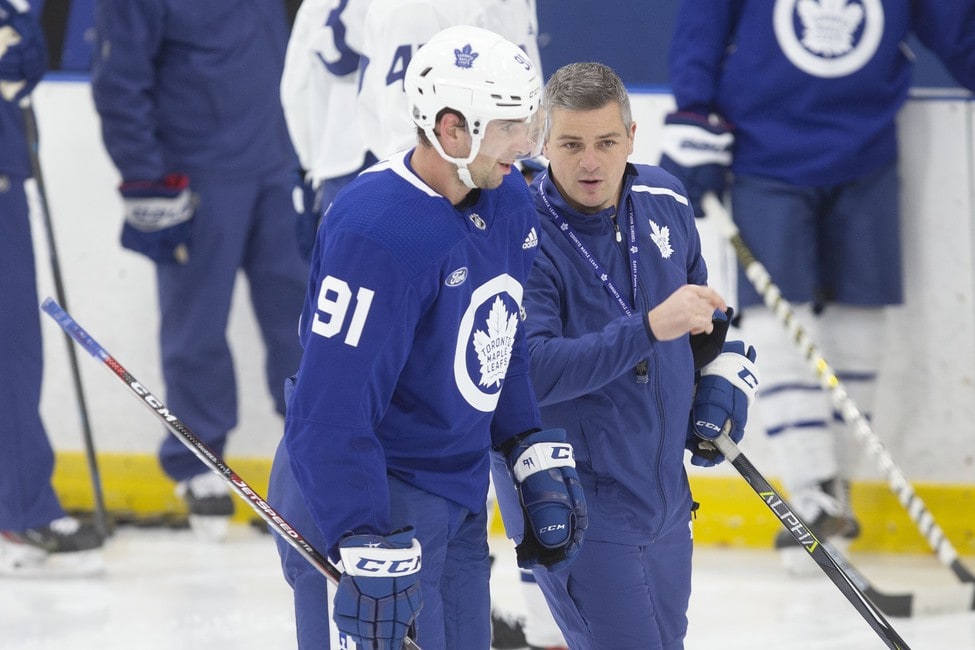Toronto Maple Leafs fans often surprise me with their negativity about their hometown team. One player who has collected his share of negative comments is John Tavares. On one hand, there’s a bit of logic to the reactions. When the Maple Leafs were “re-newing” (not rebuilding) after several seasons of despair, then-general manager (GM) Kyle Dubas believed bringing Tavares to the team would give the franchise immediate importance.
In 2018, Tavares’ Signing Signalled a Maple Leafs Rebirth
Because Tavares was a key player in the NHL during his time with the New York Islanders, bringing him home to Toronto in 2018 helped move the team into the serious-about-winning column. He was the biggest move in the team’s first big step in its renewal. That move came at a price. Tavares was signed for a handsome salary of $11 million.
Related: Today in Hockey History: April 2
Before Tavares arrived, the team was characterized by a core of drafted (potentially) elite players, a few veteran depth forwards, and middle-six center Nazem Kadri. Another former GM, Lou Lamoriello, had signed Patrick Marleau the season before, but he was far from the player he had been with the San Jose Sharks. Signing a younger star still in his prime carried an immense sense of gravitas.
Tavares, an elite player with a distinguished track record, brought substantial influence and credibility to the team. His reputation as a five-time NHL All-Star and former captain of the Islanders underscored his status as a premier talent in the league. In addition, his leadership qualities and proven success contributed to his significant impact on a burgeoning team both on and off the ice.
Four factors drove the decision to offer Tavares a high salary at the time. First, he was an elite player with exceptional scoring ability and leadership qualities. Second, his signing was regarded as a significant step towards elevating the Maple Leafs to championship contention, complementing the team’s existing but not yet proven young core of talent. Third, his status as a Toronto native generated fan excitement and added immediate star power to the organization. It offered hope to fans eager to see a hometown hero wearing the iconic blue and white jersey. Fourth, Tavares represented a long-term investment in the team’s success.
Many Knew Tavares’ Contract Would Not Age Well
Despite the high salary cap hit, the organization believed Tavares’ experience and proven track record would contribute to sustained success throughout his contract. Building a championship-calibre roster was a priority, and Tavares’ addition provided an invaluable foundation for achieving this goal. He had leadership qualities, a crucial skill set, and championship experience. He helped further the strategic goal of making the Maple Leafs perennial Stanley Cup contenders.
Sensible analysts knew that his production would wane as the contract wore on and that by the end of it, Tavares would age past his ability to produce his lofty salary. But that was a problem for later.
Related: Maple Leafs’ Best Offensive Players Through 54 Games
Interestingly, a similar situation is now at play with former Maple Leaf Zach Hyman, who is now with the Edmonton Oilers. Hyman has 52 goals on the season and is 31 years old. He also has four years remaining on his contract. It will be interesting to see if Oilers fans forget the enthusiasm of this season when he’s 35 years old and on the last legs of his deal.
Most Fans Who Critique Tavares Overestimate Their Insights
Over the seasons, it’s been commonplace (but misguided) for fans to critique decisions made six years ago, particularly given the context of the COVID-19 pandemic. This tendency towards hindsight bias allows fans to view past events as more predictable or understandable now than when they initially occurred. Many Maple Leafs fans point to signing Tavares as the pivotal error in the team’s salary cap management. However, such assertions are gross overestimations of one’s predictive abilities.
I suppose it’s human nature that fans second-guess organizational decisions based on newer insights. Even then, it’s noteworthy that criticisms of Tavares revolve more around his salary than his performance or character – which would be unjust. He has consistently demonstrated professionalism, dedication, and skill. For good or for ill, he’s come exactly as advertised.

He’s been the same player the team traded for. Since he arrived in 2018, Tavares has embodied the qualities that made him an appealing signing. He approaches his role with a strong work ethic, accountability, and a constant commitment to contributing his best efforts to the team’s success.
Tavares diligently hones his craft through off-season training and continually strives to improve his skills. His approach to the game reflects honesty and effort. For an NHL organization, having a player of Tavares’ calibre, who consistently prioritizes the team’s success, is invaluable. Despite facing criticism, Tavares remains a reliable leader and player, exemplifying the attributes that make him a valuable asset to any team fortunate enough to have him on their roster.
Despite Tavares Slowing Down, He Remains a Valuable Maple Leafs Asset
In the face of regular criticism about his salary relative to his on-ice production, Tavares continues to prove his worth. In his milestone 1,100th NHL game on Saturday, he netted the game-winning goal in a 3-0 victory over the Buffalo Sabres. He still scores and wins faceoffs. His hand-eye coordination remains exemplary.
Throughout his career, Tavares has also served as a model of the dedication and commitment NHL players need both on and off the ice. He knows he’s getting older, and his speed is slowing. During the offseason, he’s accepted the challenges of mediating his aging. Hockey is a fast-paced sport, and he continues to train to be a positive on-ice factor.
Related: A Really Early Prediction of John Tavares’ Next Contract
His scoring has slowed this season, yet it remains strong. However, more impressive is his work ethic. Moreover, Tavares’s role as team captain is characterized by honour and distinction, as he leads by example and fosters a positive team culture.
This Season Tavares Has Been Called Upon to Mentor Younger Up-and-Comers
One of Tavares’s most commendable attributes this season has been his willingness to mentor and support younger players. Despite his veteran status, he’s embraced this role. In that, he’s provided guidance both on and off the ice. His humility and selflessness have earned him respect among teammates.
Furthermore, Tavares’s relationship with the coaching staff exemplifies his professionalism. He willingly accepts any role assigned to him, whether on the top line or in a supporting role. He consistently delivers his best effort without complaint. His ability to adapt and thrive in any situation his team expects continues to showcase his value to the team.
Was Sheldon Keefe Strategic in Singling Out Tavares?
Head coach Sheldon Keefe’s decision to single out Tavares after a tough loss to the New Jersey Devils on March 26 was strategic rather than spur of the moment. Keefe understands the dynamics within his team. He also knew Tavares, as the captain and a highly respected teammate, would handle the situation well and could (and would allow himself to) serve as a rallying point for the team.

By focusing on Tavares, Keefe aimed to send a message to the entire team about the need for improvement and accountability. If it was strategic, it worked. It has galvanized the team and inspired them to elevate their game. That’s been especially true because their leader Tavares is being held to a higher standard. This suggests that Keefe’s strategy, while perhaps unconventional, effectively motivated the team to work together to address their shortcomings.
Appreciating Tavares for What He Is and Not What He Isn’t
Tavares is the captain. He’s part of the team’s leadership and is accountable for helping to drive the Maple Leafs toward success. The playoffs are coming, and the team is one of many that could go on a long postseason run.
Related: Reflecting on Tavares Milestone: Determination and Leadership
While some may question Tavares’s speed, his exceptional hand-eye coordination and scoring instincts remain key assets. He still capitalizes on scoring opportunities and makes significant contributions when it matters most. He might not be as fast as he was, but he can still score on a breakaway or tip home a shot from in front.
With over 1,000 career points, Tavares ranks among the league’s elite in his offensive production. He’s consistent and reliable. He remains a cornerstone of this Maple Leafs’ lineup, even if he’s not lighting up the scoresheet as he used to do.
